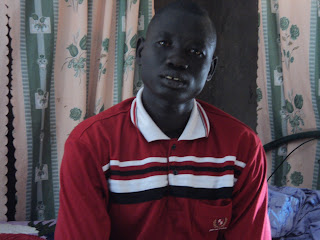Obstetric fistula ruins women’s lives in South Sudan
Obstetric fistula ruins women’s lives in South Sudan
By: Abraham Daljang
Maker
KAMPALA:
Many women in Lakes State are in pain and socially ostracized because of
obstetric fistula but treatment is in short supply.
Underage
pregnancies or extended birth can cause obstetric fistula, a condition which
blights the lives of many women in South Sudan.
“When
a woman's pelvis is small or when a caesarian section is done poorly, it
damages the woman’s birth canal,” said Peter Mangar Lual, a nurse in Akot
primary health care. Underage
pregnancies and marriages are common in the Dinka culture, which increases the
risk of the complication, which can cause a woman to leak urine or faeces,
meaning she is socially outcast.
In
South Sudan girls around six percent of women were married when they were under
15. Almost half of all women are married by the time they turn 18, a United
Nation report estimates.
Women
are more likely to suffer the condition where there is poor antenatal health
care, a reality for most in South Sudan.
Achuolic
Monydhal has suffered from obstetric fistula for about 14 years. Her search for
treatment has taken her to Khartoum in Sudan and Lokichokio in Kenya but all in
vain.
“It
was August 1999, I had a long labor which got me during a long journey on
foot,” she recalled, adding she was 17 at the time.
Her
baby was already dead when she reached a health center after two days labor.
She also sustained damage to the birth canal. “I am so traumatized because of
this illness, I can’t freely interact with people, and I feel ashamed of
myself. I feel that I am rejected by everyone,” she broke down in tears while
talking to the Niles.
Besides
this complication, Achuolic also complained that she does not have her normal
period, because she said to have allegedly been stitched badly leaving a small
opening for her period. She hopes that one day she will be treated, and will be
married to have children.
Ezekiel
manyang Akec, a midwife in Rumbek, state referral hospital, said the position
of fetus in the mother’s womb can cause this complication, for example if it
has its back or shoulder towards the birth canal or if a baby pushes the arm
out during the delivery. These positions prolong the birth and can lead to
fistula if proper medical attention is not given immediately. “I always
encourage women to attend antenatal care regularly at least four times before
giving birth,” Ezekiel said
However,
given the patchy health service, the majority of women give birth at home, helped
by traditional birth attendants who often lack the skills and equipment.
According
to a UNFPA report (United
Nations Fund for population activities), published last year, South
Sudan's maternal mortality ratio stands at 2,054 per 100,000 births, making it
among the worst in the world.
The
city of Wau showed some improvement, with the help of the UNFPA: In 2012 there were about 100 patients that came and
63 out of 100 were operated on, compared to 2006 when only 19 cases were
operated. The UNFPA also launched a campaign in Rumbek, Lakes state in 2010,
out of 100 patients that were present, 66 were confirmed with Obstetric fistula
and were treated.
South
Sudan still lags on many health issues, especially maternity healthcare. A
small portion of the total population has access to maternity healthcare
services while the vast majority suffers poor healthcare services.
A
UNFPA report suggests that just 16 percent of women have antenatal care, while
only 3.5 percent can access contraceptives. Revealing the drastic shortage of
medical staff, South Sudan has currently three surgeons and four nurses trained
in fistula repair and care respectively in the country, a meager number given
the high incidence of obstetric fistula.




Comments
Post a Comment